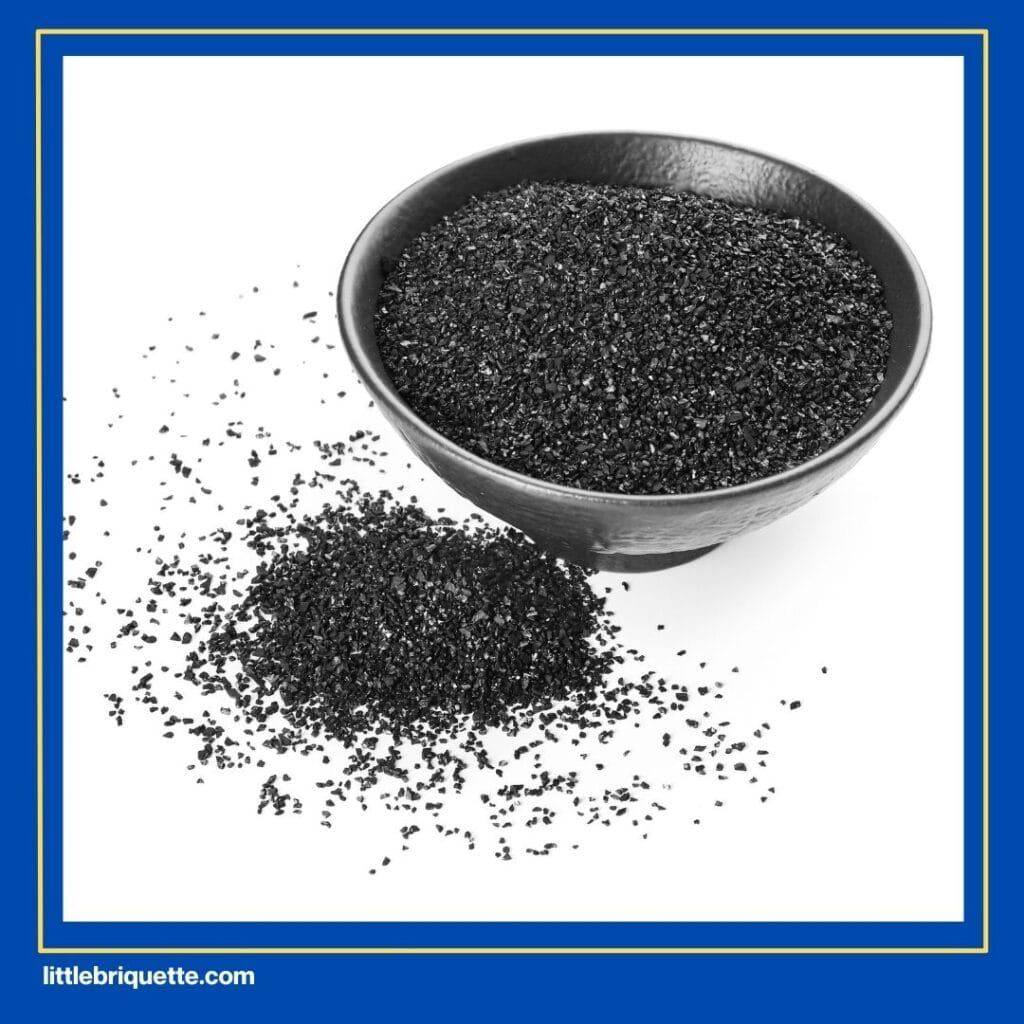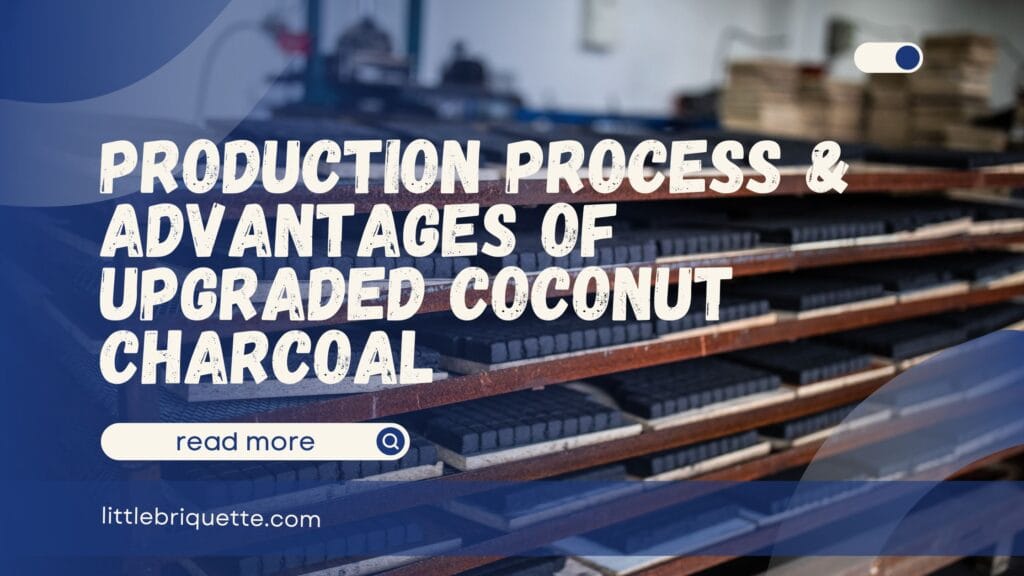Coconut charcoal, which has long been recognized as an eco-friendly fuel, now comes with an innovative upgrade, it’s upgraded coconut charcoal. The more advanced production process and the technology used in its creation make it a superior choice compared to regular coconut charcoal.
With higher quality, exceptional burning efficiency, and a lower environmental impact, this upgraded coconut charcoal offers numerous benefits that are not only advantageous for household use but also for various industries. This article will delve deeply into the production process that makes it exceptional and why an increasing number of people are switching to this enhanced quality coconut charcoal.
What is Upgraded Coconut Charcoal?
Upgraded coconut charcoal is a type of coconut charcoal that has undergone a quality enhancement process through specialized technology and methods to produce a better-quality product compared to regular coconut charcoal. While coconut charcoal is generally made from coconut shells burned at high temperatures, this type of charcoal goes through a more advanced carbonization process, resulting in charcoal with a higher carbon content, greater density, and cleaner properties.
The carbonization process reduces impurities in the charcoal and enhances its durability and combustion efficiency. As a result, upgraded coconut charcoal offers more stable burning performance, more even heat distribution, and longer burn time compared to traditional coconut charcoal.
The importance of this enhancement process lies in its ability to produce a more environmentally friendly and efficient product. The technology used in producing this coconut charcoal helps reduce emissions generated during the manufacturing process, making it more eco-friendly.
Furthermore, the improved quality of the charcoal makes it more energy-efficient and safer to use, reducing negative impacts on health and the environment. Sustainability is also a key factor, as using coconut waste as the main raw material helps minimize waste and provides a greener solution for energy needs and other products.
Read Also: Practical Guide – How to Light Briquettes Without Lighter Fluid
Production Process of Upgraded Coconut Charcoal
The production process of upgraded coconut charcoal is a key step that distinguishes this charcoal from regular coconut charcoal. It requires advanced technology and methods to ensure that each stage of production results in a more efficient, eco-friendly, and high-quality final product.
Below is the production process, starting from raw material selection to the modern technology used.
Raw Material Selection

Choosing the right raw material is the first crucial step in the production of upgraded coconut charcoal. Coconut shells are selected because they have a high fiber content and a dense structure, making them ideal for producing charcoal of superior quality. High-quality coconut shells contain more carbon and fewer impurities or substances that can reduce the quality of the charcoal.
The selection of coconut shells as raw materials also helps reduce waste in the coconut industry, making it a more environmentally friendly choice. Using high-quality raw materials also affects the combustion efficiency and durability of the charcoal produced, ultimately providing added value for consumers.
Carbonization Process of Upgraded Coconut Charcoal

After selecting the raw materials, the next step is carbonization, which involves burning the coconut shells at high temperatures under controlled conditions. During this stage, the organic material in the coconut shells is converted into carbon through heating at temperatures ranging from 400 to 700 degrees Celsius. Proper temperature control is crucial, as temperatures that are too low can result in charcoal with a low carbon content, while temperatures that are too high can damage the structure of the charcoal.
Additionally, the burning time must be carefully managed to produce dense and clean charcoal. Proper carbonization results in charcoal with higher durability, more efficient burning, and less smoke, making upgraded coconut charcoal superior for its intended uses.
Further Processing

After carbonization, the produced charcoal still requires further processing to enhance its quality. One of the key stages in this process is activation, which aims to increase the surface area of the charcoal and its ability to absorb certain substances.
Activation can be carried out using hot air or steam, which opens the pores in the charcoal, making it more effective at absorbing contaminants or chemicals. In addition to activation, a purification process is also performed to remove non-carbon residues such as ash or minerals, which can reduce the quality of the charcoal. This process results in upgraded coconut charcoal that is cleaner, denser, and more effective for various applications.
Modern Technologies Used

In the production process of upgraded coconut charcoal, the use of modern technology is essential to ensure that each stage is efficient and environmentally friendly. One of the technologies employed is clean combustion, designed to reduce harmful gas emissions and optimize energy use during the carbonization process. This technology ensures that nearly all the energy generated from burning the coconut shells is maximized.
In addition, many producers now utilize renewable energy sources, such as biomass or solar energy, to reduce dependence on fossil fuels and lower the carbon footprint of the production process. These technologies not only enhance the quality of the product but also support environmental sustainability by minimizing the negative impacts typically produced by traditional charcoal manufacturing processes.
Advantages Provided
Upgraded coconut charcoal has a higher carbon content compared to regular coconut charcoal, which is one of the key factors that make it more efficient in combustion. The more advanced carbonization process produces charcoal with a denser structure and more carbon, allowing this type of charcoal to burn longer and with more intense heat.
The high carbon content also impacts the durability of the charcoal, as charcoal with more carbon will last longer and produce less ash after use. This is especially beneficial for those seeking a more efficient and cost-effective energy source. Furthermore, the combustion of upgraded coconut charcoal generates a more stable and even flame, allowing users to better control the temperature during cooking or in industrial applications.
Additionally, using coconut shells as the primary raw material reduces organic waste from the coconut industry, making it a more sustainable choice. Upgraded coconut charcoal also has a broader range of applications, from household needs like barbecuing or cooking to industrial uses such as filtration and water treatment. This product is even used in health and hygiene products, like face masks or odor absorbers.
Read Also: Cooking with Charcoal Briquette, Techniques You Need to Know!
Coconut Charcoal Briquettes with the Best Quality
Choosing the best quality coconut charcoal briquettes for cooking, grilling, or BBQ is very important. This is because coconut charcoal briquettes play a crucial role as a fuel source. By using high-quality briquettes, you can reduce negative impacts, such as suboptimal cooking results and digestive issues caused by poor-quality charcoal.
To achieve the best cooking results, you can choose to purchase coconut charcoal briquettes from Little Briquette, which is certified as one of the best coconut charcoal briquette manufacturers in Indonesia. Little Briquette offers delivery to various countries. Contact the admin at this number and get optimal cooking results with the coconut charcoal briquettes you use!

